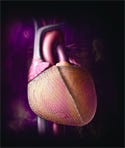February 1, 2007
NEWS TRENDS
|
An independent panel agreed with FDA's decision not to approve Acorn's CorCap cardiac support device. |
The Medical Devices Dispute Resolution Panel (MDDRP) in December convened for only the second time ever, and the panel dealt Acorn Cardiovascular (St. Paul, MN) a setback.
The independent panel agreed with FDA's decision not to approve the company's ventricular support device.
The product in dispute was Acorn's CorCap cardiac support device (known as the “heart sock”), a mesh wrap that encloses the heart to provide muscle support and reduce ventricular enlargement. In June 2005, FDA's Circulatory System Advisory Panel recommended against the device's approval, after which CDRH suggested a small confirmatory trial. Company officials disagreed and requested a referral to MDDRP.
“The trial met all its success parameters, and numerous independent clinical and statistical experts have affirmed the robustness of the trial,” said vice president Steve Anderson before the panel convened. But panel experts, in a 3–1 vote, said more clinical data are needed before the device is made available to the public.
MDDRP was created to be a useful tool for industry seeking a second opinion on the approvability of a product. It was established via the FDA Modernization Act of 1997 to resolve disputes between the agency and manufacturers. But the panel has seen little use since its inception. In fact, the panel has only been convened once before—in the case of Lifecore Biomedical Inc.'s Intergel, a sterile product created to prevent surgical adhesions.
In 2000, FDA rejected Lifecore's PMA application for the product. Seeking an alternative solution, it requested a review from the panel. Intergel was unanimously approved, and premarket approval was granted a short time after.
The panel was scheduled for a second assembly in 2003 over CardioGenesis Corp.'s myocardial revascularization device, but the company cancelled the meeting and supplemented its PMA application with additional information. Another panel is slated for later this year to review Cardima Inc.'s (Fremont, CA) catheter system. Most disputes between CDRH and device companies are resolved before they reach the panel.
Although the panel's decision is the most influential in determining the fate of a product, there are more steps to follow. After the MDDRP meeting, the CDRH ombudsman prepares a statement of findings. Eventually, the findings are routed to the CDRH director to make a final decision on the product.
Acorn states that more than 450 patients worldwide have received its new treatment, which can reportedly halt the progression of heart failure.
Copyright ©2007 Medical Device & Diagnostic Industry
About the Author(s)
You May Also Like



